

According to the World Health Organization, over 264 million people worldwide live with depression, affecting not only emotional well-being but also energy, motivation, and overall health. Common symptoms include persistent sadness, feeling lonely and disengaged from hobbies, sleep disturbances, fatigue, and even chronic aches and pains.
Whether you're navigating it yourself or supporting someone you love, it's often difficult to know where to begin. While therapy and medication are essential, yoga for depression is emerging as a powerful, science-backed tool to complement your healing journey.
Continue reading to learn 8 beginner-friendly yoga poses proven to uplift mood and restore balance, and discover some breathing techniques to relieve the symptoms of depression.
Science is beginning to confirm what ancient yogis long believed: the mind and body are deeply connected, and healing often requires nurturing both. In fact, studies show that consistent yoga practice, lasting 10-12 weeks, can reduce depressive symptoms and improve quality of life, sleep, and emotional regulation.
Ramanujan, a certified yoga therapist at MyYogaTeacher, says, “Rooted in ancient wisdom and supported by modern research, yoga postures, breathwork, and mindfulness practices gently reconnect the body and mind, offering both relief and resilience.”
Besides mood and emotional changes, depression also creates physiological changes. It disrupts brain chemistry, alters hormone levels, and often increases inflammation in the body. People with depression typically experience lower levels of serotonin, dopamine, and GABA—neurotransmitters vital for mood regulation, motivation, and emotional balance. This can lead to stress and anxiety.
Additionally, chronic stress associated with depression elevates pro-inflammatory cytokines, which have been linked to fatigue, poor sleep, and cognitive impairment.
Consistent yoga practice can positively influence the biological systems impacted by depression. Research highlights yoga’s therapeutic potential to:
The multi-dimensional approach of yoga—combining movement, breath, and mindfulness—appears particularly effective for mental health support. It activates the parasympathetic nervous system, which helps the body feel safe and calm.
Gentle, intentional movement can offer profound relief from depression. These eight beginner-friendly depression yoga poses are designed to soothe the nervous system, increase energy, and uplift mood:
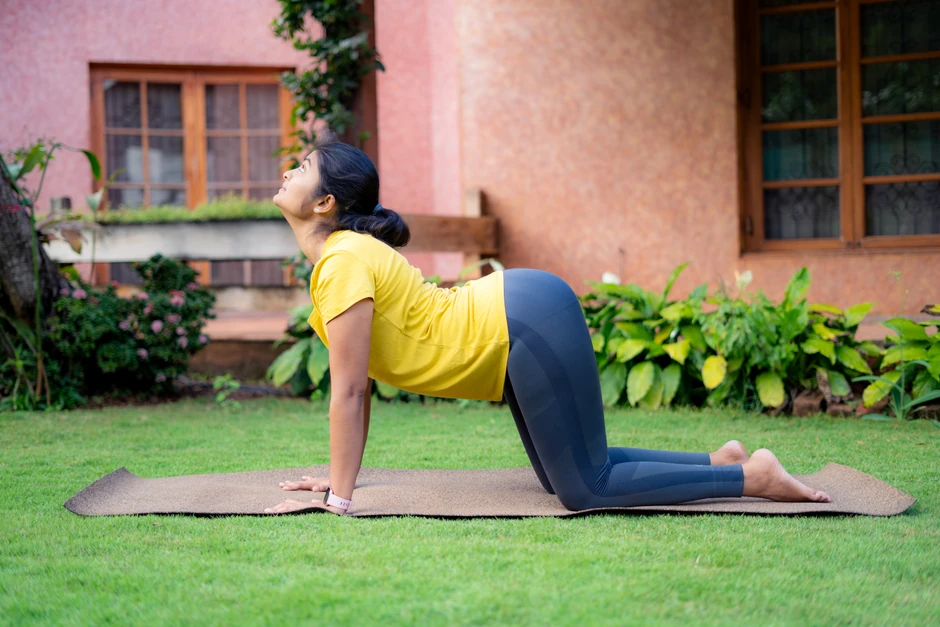
This gentle flow helps warm up the spine and bring awareness to breath and body. It releases tension in the back and neck, encourages deep breathing, and gently energizes the body.
Modification: Place a folded blanket under the knees and move slowly; focus on breath rather than depth of motion.
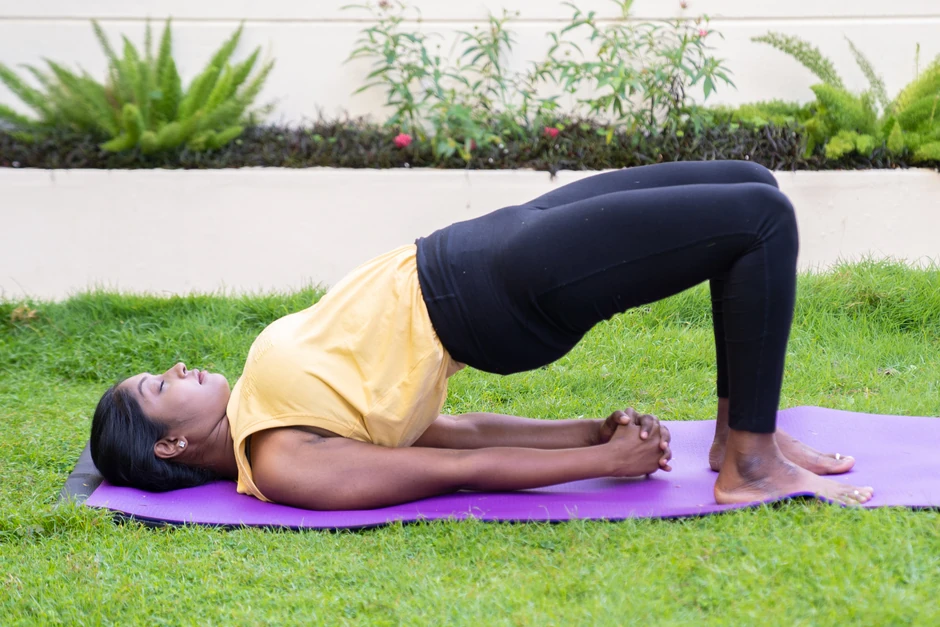
This gentle backbend opens the chest and shoulders, improves circulation, and stimulates the thyroid gland—supporting mood regulation.
Modification: Place a yoga block or cushion under your sacrum and rest in a supported version.
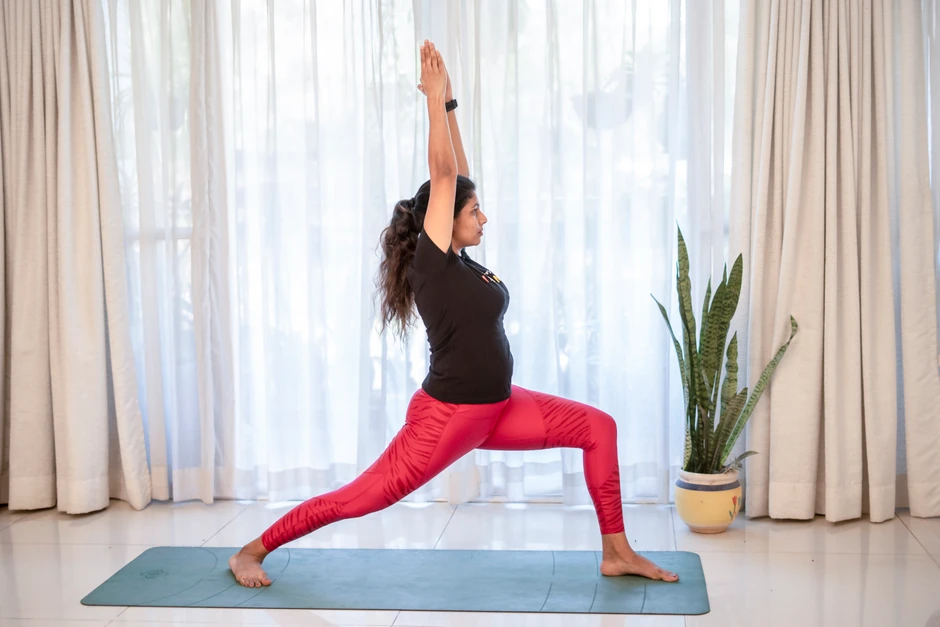
This strong, upright pose boosts self-esteem, improves focus by promoting better balance, and strengthens the mind-body connection.
Modification: Shorten the stance and keep hands at the heart center.
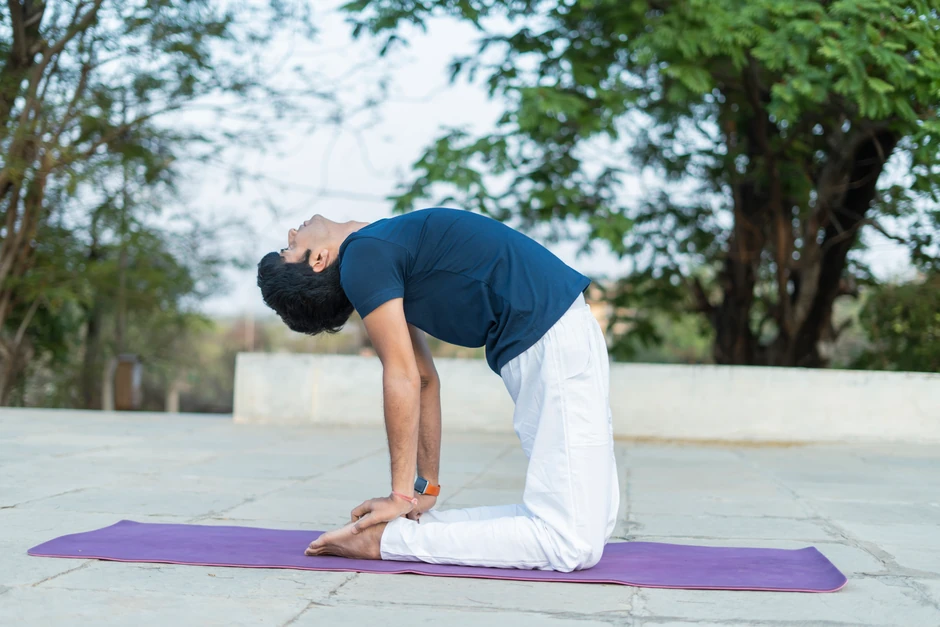
A gentle heart-opening backbend that helps release emotional tension and expand breath.
Modification: Keep your chin tucked and use a wall or bolster behind for support.
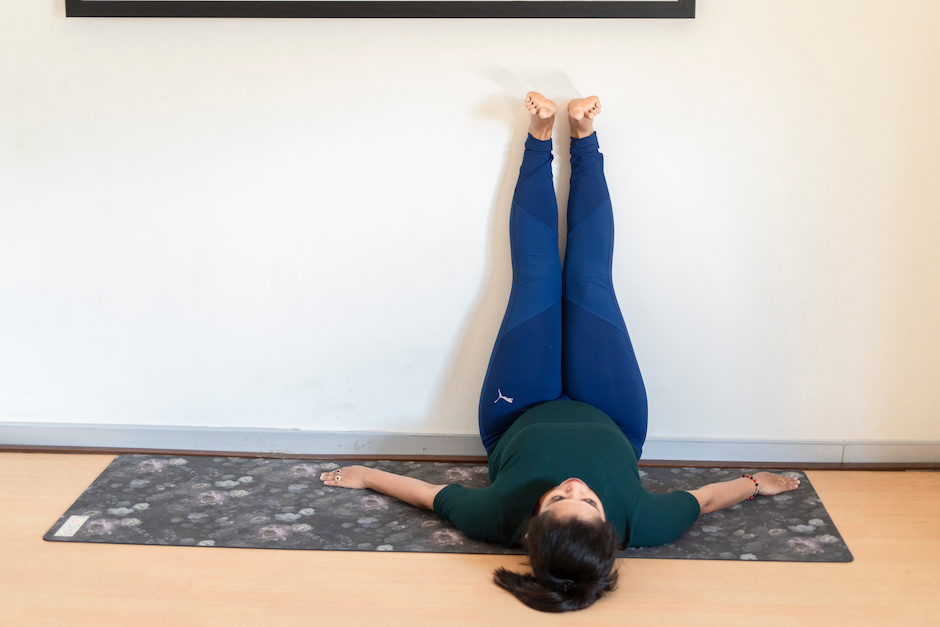
A restorative inversion that calms the nervous system and improves circulation. Holding this pose also soothes anxiety, drains fatigue from the legs, and promotes parasympathetic relaxation.
Modification: Place a bolster or folded blanket under your hips.
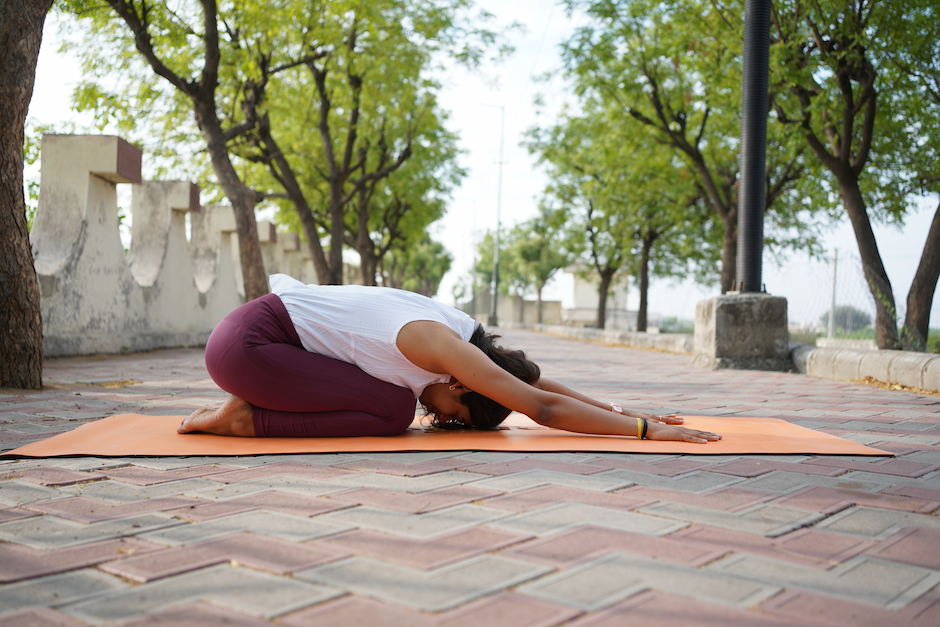
A deeply grounding pose that calms the mind, provides rest, relieves tension, and creates a sense of inner security.
Modification: Use a bolster under your chest or a blanket under your hips.
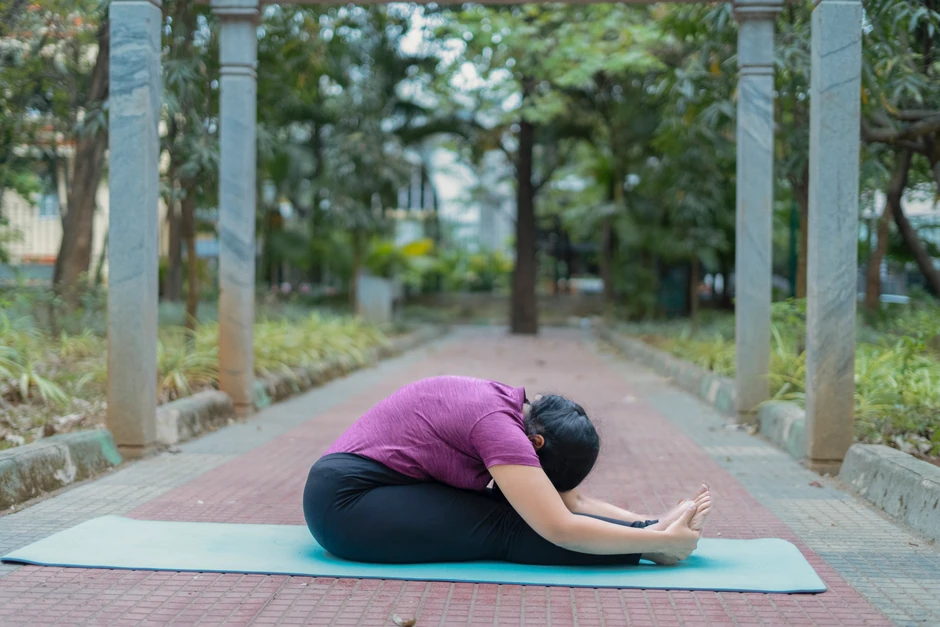
A calming forward bend that eases mental chatter, soothes the nervous system, and supports emotional release.
Modification: Sit on a folded blanket and bend the knees generously.
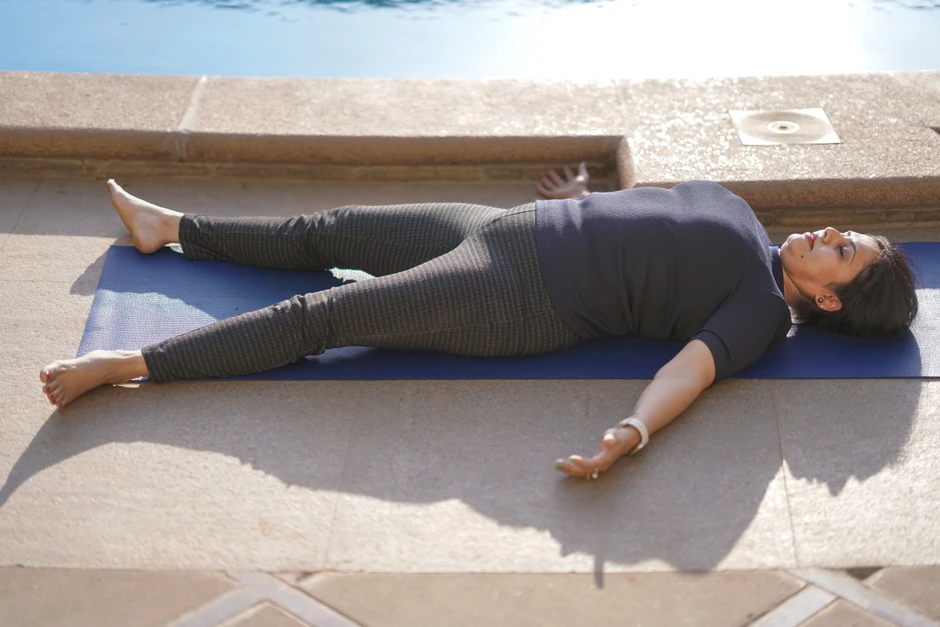
This ultimate relaxation posture encourages deep rest, releases emotional tension, and resets the nervous system.
Modification: Place a bolster under your knees or a blanket over your body.
While these poses are easy to follow, doing them under expert supervision ensure you maximize the benefits of yoga for depression practice. Book a free 1-on-1 session with an expert and experience the first-hand benefits of a guided practice.
Breath is one of the most powerful, yet overlooked, tools for managing depression. Gentle breathing practices (pranayama) can calm the nervous system, ease anxiety, and create a sense of grounded presence. A few simple breathing techniques include:
A foundational breathing technique that promotes deep relaxation, reduces shallow breathing patterns common in depression, and restores emotional balance.
A grounding breath that supports focus and calm by reducing overthinking, anchoring attention, and activating the parasympathetic nervous system.
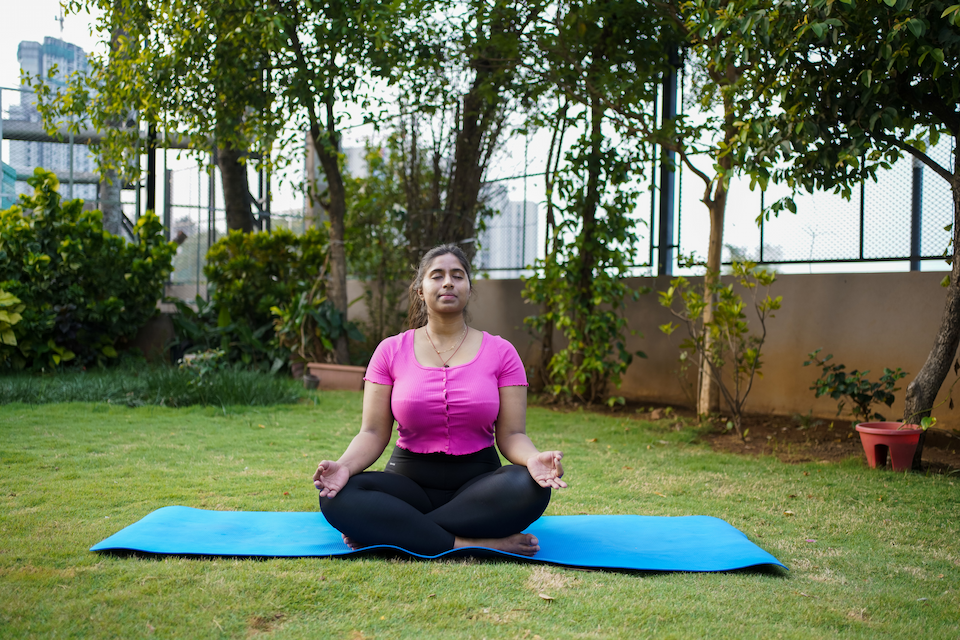
A soothing breath that uses gentle sound vibration to reduce anxiety, quiet racing thoughts, and induce a meditative state.
These breathing exercises can come in handy anytime you feel agitated or stressed. Start with just 3–5 minutes a day and notice your state of mind change over time.
To make sure you do them correctly, start out with this group class on Breathing and Meditation to learn from an expert!
Depression can make everything feel overwhelming—even starting out with yoga. That’s why the key is gentleness and consistency, not intensity. Even a few minutes of yoga each day can create meaningful shifts in mood, energy, and self-connection. Here’s how to build a practice that feels doable even when you’re feeling low and fatigued:
Start your day with grounding and light activation.
This routine is ideal to gently awaken the spine, boost circulation, and clear morning fog.
When the day feels heavy or scattered, try this routine to recenter yourself.
This flow builds energy and presence, opens the chest, and supports emotional release.
Wind down with deep relaxation and a nervous system reset.
This routine helps calm the mind, reduce anxiety, and prepare the body for rest.
Before starting your yoga practice, here are a few things to consider:
Yoga offers a compassionate, science-backed path forward to manage the symptoms of depression. From simple breathing practices to supportive poses, it helps reconnect you with your body, soothe your nervous system, and rebuild inner strength—one breath at a time.
This isn’t about perfection. It’s about progress. With consistency and the right guidance, even five minutes a day can open the door to more peace, better sleep, steadier moods, and a stronger sense of self.
Ready to begin your healing journey? Sign-up for a free trial today!
Yoga supports depression recovery by calming the nervous system, increasing feel-good neurotransmitters like serotonin and GABA, and reducing inflammation. It also helps you reconnect with your body and breath, offering emotional release and resilience.
Gentle, grounding poses are particularly effective. These include:
These postures relax the body, support nervous system balance, and create a safe space for emotional healing.
Yes—when practiced gently and with awareness, yoga is safe and supportive. It’s important to listen to your body and consider starting with a teacher trained in mental health-sensitive approaches, especially if symptoms are severe.
Yoga therapy is a personalized, trauma-informed approach that uses gentle movement, breathwork, and mindfulness to support depression recovery. Sessions are often 1-on-1 and tailored to your emotional and physical needs. It complements therapy or medication by reducing stress, improving sleep, and promoting emotional balance—guided by yoga instructors trained in mental health awareness.

Receive personalized guidance tailored to your unique fitness goals, live with a dedicated coach—no credit card required.